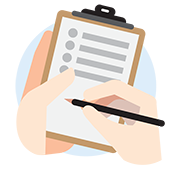Work out what supplies you need Whiriwhiria ngā rawa ka hiahiatia
In an emergency, you may be stuck at home for three days or more. Figure out what supplies you need and make a plan to work out what you need to get through.
On this page
At home
In an emergency, you may be stuck at home for three days or more. Figure out what supplies you need and make a plan to work out what you need to get through.
You probably have most of the things you need already. You don’t have to have them all in one place, but you might have to find them in a hurry and/or in the dark.
- Water for three days or more — make sure you have at least nine litres of water for every person. This will be enough for drinking and basic hygiene. Don’t forget water for babies and pets too.
- Long-lasting food that doesn’t need cooking (unless you have a camping stove or gas barbecue) and food for babies and pets.
- Work gloves and a properly-fitted P2 or N95 mask.
If you have special dietary needs, make sure you have enough to last three days at home. If you have to evacuate, emergency shelters may not have the food that you need.
Power cuts could affect EFTPOS and ATM machines, so it’s a good idea to have some cash at home.
Don't forget that you and your neighbours can help each other by sharing supplies too.
By looking after yourself and your household, you'll also be helping emergency services focus their limited resources on the people who need the most help.
Emergency toilets
In an emergency, you might not have water. The water supply may be cut off, or water and sewerage lines may be damaged. You may need to use improvised emergency toilets.
To make an emergency toilet, use sturdy, watertight containers that can hold approximately 15 – 20 litres. For example, a rubbish bin or an empty paint bucket. Your container should have a snug-fitting cover.
If the container is small, keep a large container with a snug-fitting cover for waste disposal.
- Line buckets with plastic bags (if possible).
- Pour or sprinkle a small amount of regular household disinfectant (such as chlorine bleach) into the container each time the toilet is used. This will reduce odour and germs. If you don’t have disinfectant, you can use dirt and dry materials.
- Replace the lid after each use.
- After using the toilet, wash your hands thoroughly using soap and water, or use hand sanitiser.
- When your toilet reaches capacity, dispose of the waste following public health advice.

Water supplies, including drinking water, could be affected in an emergency. Have a supply of stored water for three days or more. Find out more about storing water.
In a grab bag
Have grab bags ready for everyone in your family. Each bag should have:
- Walking shoes, warm clothes, raincoat and hat
- Water and snack food (remember babies and pets too)
- Hand sanitiser
- Portable phone charger
- Cash
- Copies of important documents and photo ID
Remember any medications you might need and keep your first aid kit, mask or face covering, torch, radio and batteries somewhere you can grab them in a hurry.
Put a writing pad, pencils and a torch with batteries in your grab bag so you can communicate with others.
If you have special dietary needs, make sure you have the food you need in your grab bag too.
In your car or at work
Plan ahead for what you will do if you are in your car when an emergency happens. A flood, snow storm or major traffic accident could leave you stranded in your vehicle for some time.
Keep essential emergency survival items in your car. If you are driving in extreme winter conditions, add:
- a brush
- a shovel
- tire chains
- windshield scrapers, and
- warm clothing.
Store a pair of walking shoes, a waterproof jacket, essential medicines, snack food, water, a phone charger lead and a torch in your car.
Keep up to date with weather and road information when planning travel.
Make sure you have supplies at work including sturdy walking shoes, a waterproof jacket, a torch, snack food and water. Connect with those who live in the same area. You can work together to get home during an emergency.

Plan your route with live traffic and travel information on the Waka Kotahi website.
Get your household ready
It’s up to you to make sure your whānau know what to do and that you all have what you need to get through.






